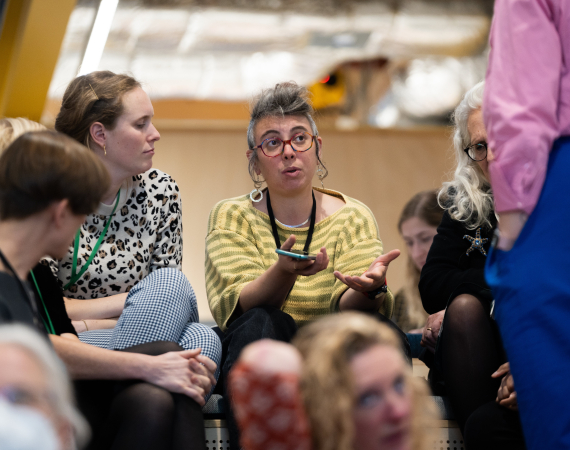Article
Posted on Tue 14 Feb 2023
Community Conversation: NFTs, Crypto & Blockchain
Last month, we hosted a conversation to discuss the issues, and what our relative responsibilities might be with a new and risky area of technology.

Jon Aitken Hopeful Futures 2022 (image not of this event)
Posted by
We know that conversations around blockchain enabled technologies (including cryptocurrencies and NFTs) are happening in the Studio, often among people who broadly share the same opinions. We think the value of our community is that we are made up of very different perspectives, practices and approaches. So last month, we hosted a conversation to discuss the issues, and what our relative responsibilities might be with a new and risky area of technology. We invited those who felt comfortable doing so, to kickstart the discussion by talking for 5 minutes about their experience, knowledge or curiosity on the topic.
Who came:
Martin O’Leary, Victoria Tillotson, Furaha Asani, Danielle Rose, Tarim, Vince Baidoo, Tim Kindberg, Duncan Speakman, Richard Norton (Norts), Derek Ahmedzai, Verity McIntosh.
The discussion was chaired by me and Atau Tanaka. As well as being a researcher at the University of Bristol, Atau is a composer and performer who has been critically examining the adoption of blockchain and cryptocurrency technologies in the cultural sector. We aimed to encourage a respectful space in which people felt able to share opinions, ask questions, acknowledge contradictions, disagree with each other and change their minds.
Our conversation was punctuated by short presentations:
Verity McIntosh: What questions should we be asking as we embark on a new project using NFTs?
Tim Kindberg: How I could have implemented NFTs back in the 1980s, and why I still wouldn't
Norts & Derek Ahmedzai: Positive uses of NFTs for artists, creatives and musicians, exploring the ethical ways to use NFTs as a revenue stream and as a channel for talking to fans
Tarim: What does it mean to ‘own’ something? a look at the nature of ownership, particularly ownership of information.
What we talked about:
-
This is not new
Development of blockchain technologies, cryptocurrencies and of systems for digital proof of ownership goes back decades. It is useful to remember this because it throws the current hype about them – which takes the form of both evangelical support for, and apocalyptic warnings against – into sharp relief.
The polarised conversation that this hype tends to create can obscure the multitude of ways in which blockchain products are being thought about and used – everything gets lumped together and a lot of the subtleties are lost. This can heighten the financial risk for people as navigating their way through all the noise is difficult. It also tends to ignore the fact that individual risk should be understood in context e.g. incentives to invest in cryptocurrencies might be different in a country with a less stable currency.
-
Proof of work v proof of stake
Many of the concerns people have about blockchain technologies relate to the environmental impact from the huge energy consumption in the process. Systems that rely on ‘proof of stake’ rather than ‘proof of work’ have reduced this massively.
However, this shift has created much higher financial barriers to entry, so while the system was always open to manipulation – it might now more directly reflect existing global structures of wealth. We should therefore be asking what this means for desires about democratising and decentralising economic power, and recognising the privilege built into critiques around climate change.
-
Where is the value?
We talked a lot about NFTs, and about what they can do that offers any real additional value.
NFTs are about proving ownership. Ownership gives us rights over, or in relation to, things in the world. This sense of possession is woven through our relationships and built into our everyday language. But given how easily digital artifacts can be replicated and how volatile the financial value of NFTs and cryptocurrencies are, are they the wrong answer to an important question?
It is useful to remember though, that value has always been about much more than the utility of an object, or the hoarding of a scarce resource. From brand logos on a jumper, to buying dances in Fortnite to NFTs – signifiers of identity, membership and fandom are really important to people. In both the physical and digital world.
-
Trust
There is an inherent distrust of centralised power in the design of blockchain. It is a system designed to ensure that we don’t need to trust other people to behave well. What then are the dangers of trusting, but also of not trusting governments? And who do we trust and why?
Maybe trust is, in part, built around community. We have faith that people who seem to be ‘more like us’ will make decisions that are more in our interests. What might we learn from examples like the Bristol Pound about the role that geographic proximity has to play. How would we feel about blockchain if it was designed by our friends?
This was the first in a series of Community Conversations that will bring people together to talk about the issues they care about.
